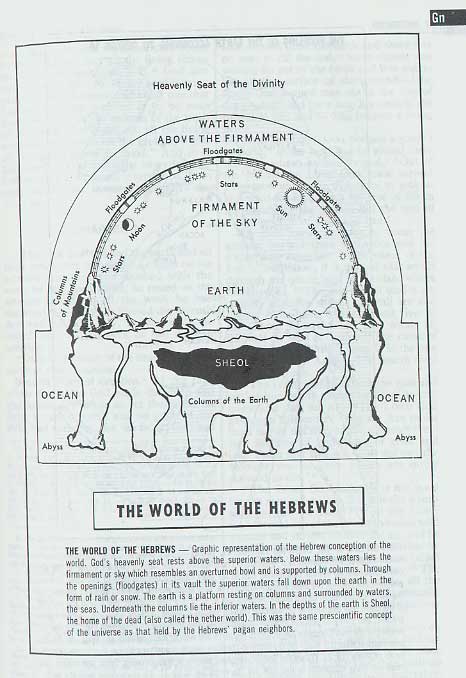ElyrionX said:
Ummm, pardon my ignorance but are all Christians creationist? Or do some Christians believe in evolution? If some Christians actually believe in evolution, how do they reconcile this with their faith?
http://www.talkorigins.org/faqs/wic.html
"Despite many people's tendency to think of all creationists in one group and all evolutionists in another, "creationism" refers to a wide range of beliefs. This article gives a brief introduction to creationist positions. It tries to cover the breadth of creationist beliefs (and a little of the variety of evolutionist belief), but it gives little depth. In addition to the positions, it lists some influential people, organizations, books, and periodicals which espouse the positions. Interested readers may look up these references. Also, a section near the end gives suggestions for further reading.
The differences between types of creationism are not minor. Most of the creationist beliefs described below are mutually exclusive, and often their differences are as great as their differences with evolution. Many creationists disagree as much with other creationists as they do with evolutionists. Morris, for example, devotes the last 20% of his book Scientific Creationism to attacks on other forms of creationism (Morris 1985).
Part 1 of this article examines varieties of Christian Creationism, because Christianity in its various forms is by far the most prevalent religion in the United States. (Creationism in any form is a relatively minor force in other parts of the world.) Since creationism grades gradually into evolution, part 1 also considers evolutionary beliefs. Part 2 considers non-Christian creationism and some other views of origins. Creationist ideas through history and non-creationist anti-evolutionism are not covered here (but see the "Further Reading" section).
Part 1: The Creation/Evolution Continuum in Christian Creationism
Creation and evolution are not a dichotomy, but ends of a continuum (see figure), and most creationist and evolutionist positions may be fit along this continuum (Scott 1999). The successive steps labelled in the figure are described below.
* CREATION
o Flat Earthers
o Geocentrists
o Young Earth Creationists
+ (Omphalos)
o Old Earth Creationists
+ (Gap Creationism)
+ (Day-Age Creationism)
+ (Progressive Creationism)
+ (Intelligent Design Creationism)
o Evolutionary Creationists
o Theistic Evolutionists
o Methodological Materialistic Evolutionists
o Philosophical Materialistic Evolutionists
* EVOLUTION
Flat Earthers
Flat Earthers believe that the earth is flat and is covered by a solid dome or firmament. Waters above the firmament were the source of Noah's flood. This belief is based on a literal reading of the Bible, such as references to the "four corners of the earth" and the "circle of the earth." Few people hold this extreme view, but some do.
* International Flat Earth Society, Box 2533, Lancaster, CA.
Charles K. Johnson
Geocentrism
Geocentrists accept a spherical earth but deny that the sun is the center of the solar system or that the earth moves. As with flat-earth views, the water of Noah's flood came from above a solid firmament. The basis for their belief is a literal reading of the Bible. "It is not an interpretation at all, it is what the words say." (Willis 2000) Both flat-earthers and geocentrists reflect the cosmological views of ancient Hebrews. Geocentrism is not common today, but one geocentrist (Tom Willis) was intrumental in revising the Kansas elementary school curriculum to remove references to evolution, earth history, and science methodology.
* Biblical Astronomer, Cleveland, OH
http://www.biblicalastronomer.org/
Gerardus Bouw
* Creation Science Association for Mid-America, Cleveland, MO.
http://www.csama.org/
Tom Willis
Young-Earth Creationism
Young Earth Creationists (YEC) claim a literal interpretation of the Bible as a basis for their beliefs. They believe that the earth is 6000 to 10,000 years old, that all life was created in six literal days, that death and decay came as a result of Adam & Eve's Fall, and that geology must be interpreted in terms of Noah's Flood. However, they accept a spherical earth and heliocentric solar system. Young-Earth Creationists popularized the modern movement of scientific creationism by taking the ideas of George McCready Price, a Seventh Day Adventist, and publishing them in The Genesis Flood (Whitcomb & Morris 1961). YEC is probably the most influential brand of creationism today.
* Institute for Creation Research (ICR), El Cajon, CA.
http://www.icr.org/
Henry Morris (president emeritus), John D. Morris (president), Duane Gish, Steven A. Austin, Larry Vardiman, Kenneth B. Cumming, Andrew Snelling, ...
Whitcomb, John C. & Henry M. Morris, The Genesis Flood (The Presbyterian and Reformed Publishing Co., Philadelphia, PA, 1961)
Morris, Henry M., Scientific Creationism (Master Books, Green Forest, AR, 1974, 1985)
newsletter: Acts & Facts (includes Back to Genesis and Impact)
* Answers in Genesis (AIG), Florence, KY.
http://www.answersingenesis.org/
Ken Ham
periodical: Creation Ex Nihilo
* Creation Research Society (CRS), St. Joseph, MO.
http://www.creationresearch.org/
D. Russell Humphreys, Wayne Friar, Donald B. DeYoung, Eugene F. Chaffin
periodical: Creation Research Society Quarterly
* Creation Science Evangelism, Pensacola, FL.
http://www.drdino.com/
Kent Hovind
* Carl Baugh
Creation Evidences Museum, Glen Rose, TX.
Omphalos
The Omphalos argument, first expounded in a book of that name by Philip Henry Gosse (1857), argues that the universe was created young but with the appearance of age, indeed that an appearance of age is necessary. This position appears in some contemporary young earth creationist writing. For example, Whitcomb & Morris (1961, p. 232) argue that earth's original soils were created appearing old. The position is sometimes satirized by suggesting that the universe was created last week with only an appearance of older history.
Old Earth Creationism
Old-Earth Creationists accept the evidence for an ancient earth but still believe that life was specially created by God, and they still base their beliefs on the Bible. There are a few different ways of accomodating their religion with science.
* American Scientific Affiliation, Ipswich, MA.
(This groups has mostly OEC members, but it doesn't turn away members and has some YEC and Theistic Evolutionist members, too.)
http://www.asa3.org/index.html
periodical: Perpsectives on Science and Christian Faith
Gap Creationism (also known as Restitution Creationism)
This view says that there was a long temporal gap between Genesis 1:1 and Genesis 1:2, with God recreating the world in 6 days after the gap. This allows both an ancient earth and a Biblical special creation.
* Armstrong, Herbert W., Mystery of the Ages. Dodd, Mead, New York, 1985.
* Jimmy Swaggart
Day-Age Creationism
Day-age creationists interpret each day of creation as a long period of time, even thousands or millions of years. They see a parallel between the order of events presented in Genesis 1 and the order accepted by mainstream science. Day-Age Creationism was more popular than Gap Creationism in the 19th and and early 20th centuries.
* Anonymous, Life--How Did It Get Here? By Evolution or Creation? (Watchtower Bible and Tract Society of New York, Booklyn, NY, 1985)
Progressive Creationism
Progressive Creationism is the most common Old-Earth Creationism view today. It accepts most of modern physical science, even viewing the Big Bang as evidence of the creative power of God, but rejects much of modern biology. Progressive Creationists generally believe that God created "kinds" of organisms sequentially, in the order seen in the fossil record, but say that the newer kinds are specially created, not genetically related to older kinds.
* Reasons To Believe, Pasadena, CA.
http://www.reasons.org/
Hugh Ross
Intelligent Design Creationism
Intelligent Design Creationism descended from Paley's argument that God's design could be seen in life (Paley 1803). Modern IDC still makes appeals to the complexity of life and so varies little from the substance of Paley's argument, but the arguments have become far more technical, delving into microbiology and mathematical logic.
In large part, Intelligent Design Creationism is used today as an umbrella anti-evolution position under which creationists of all flavors may unite in an attack on scientific methodology in general (CRSC, 1999). A common tenet of IDC is that all beliefs about evolution equate to philosophical materialism.
* Discovery Institute, Seattle, WA.,
Center for Renewal of Science and Culture (CRSC)
http://www.discovery.org/csc/
Phillip Johnson, Michael Behe, William Dembski, Paul Nelson, Jonathan Wells, Stephen C. Meyer.
periodical: Origins & Design
Behe, Michael, Darwin's Black Box (Free Press, NY, 1996)
Dembski, William, The Design Inference (Cambridge University Press, Cambridge, UK, 1998)
Johnson, Phillip, Reason in the Balance (Inter-Varsity, Downers Grove, IL, 1995)
* Davis, Percival & D. H. Kenyon, Of Pandas and People (Haughton, Dallas, TX, 1989)
Evolutionary Creationism
Evolutionary Creationism differs from Theistic Evolution only in its theology, not in its science. It says that God operates not in the gaps, but that nature has no existence independent of His will. It allows interpretations consistent with both a literal Genesis and objective science, allowing, for example, that the events of creation occurred, but not in time as we know it, and that Adam was not the first biological human but the first spiritually aware one.
* Schneider, Susan, 1984. Evolutionary creationism: Torah solves the problem of missing links.
http://www.orot.com/ec.html
Theistic Evolution
Theistic Evolution says that God creates through evolution. Theistic Evolutionists vary in beliefs about how much God intervenes in the process. It accepts most or all of modern science, but it invokes God for some things outside the realm of science, such as the creation of the human soul. This position is promoted by the Pope and taught at mainline Protestant seminaries.
* Teilhard de Chardin, Pierre, The Phenomenon of Man (HarperCollin, San Francisco, 1959, 1980)
Methodological Materialistic Evolution
Materialistic Evolution differs from Theistic Evolution in saying that God does not actively interfere with evolution. It is not necessarily atheistic, though; many Materialistic Evolutionists believe that God created evolution, for example. Materialistic evolution may be divided into methodological and philosophical materialism. Methodological materialism limits itself to describing the natural world with natural causes; it says nothing at all about the supernatural, neither affirming nor denying its existence or its role in life.
* Gould, Stephen J., Rock of Ages: Science and Religion in the Fullness of Life (Ballantine Publishing Group, NY, 1999)
Philosophical Materialistic Evolution
Philosophical materialism says that the supernatural does not exist. It says that not only is evolution a natural process, but so is everything else.
* Richard Dawkins
* William Provine"
There's more at the link about non-religious creationism.
...




